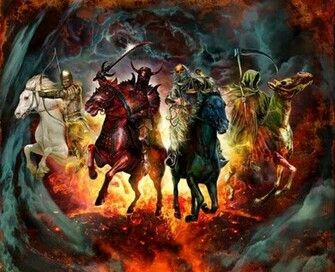26 years ago, close to Thanksgiving, a father figure vanished from my family's life, leaving behind unanswered questions and a lingering sense of loss. His sudden absence still echoes through my memories, raising thoughts of what could have been and what relationships might have flourished. Life continued its course, but amidst the turmoil, my wife and I found out my daughter was on the way. This sparked the question if he would have known would it have changed his mind to end his life, perhaps altering the trajectory of events.
As I reflect on my personal narrative, I am drawn to explore the parallels between real-life experiences and the thematic explorations found in the realms of science fiction and biblical teachings. In doing so, I aim to deal with the complexities of human emotion, the nuances of sacrifice versus selfishness, and the varied cultural perceptions surrounding the concept of suicide. I also had to deal with the belief that suicide was a sin that could not be pardoned by God.
In the expansive universe of Star Wars, I could not find a scene of suicide. However, self-sacrifice often takes center stage, yet it is depicted as a noble act undertaken for the greater good. Characters like Ben Kenobi and Vice Admiral Holdo willingly lay down their lives to advance the cause of freedom and justice, their actions serving as catalysts for change rather than expressions of despair. Their sacrifices are portrayed as strategic choices made to tip the scales in favor of the oppressed, thus embodying the notion of selflessness in the face of adversity. This is a small embodiment of what Christ had done for us.
Conversely, the Star Trek franchise explores the theme of suicide more directly, often confronting the existential dilemmas of its characters with thought-provoking narratives. In the case of Voyager's encounter with Quinn of the Q Continuum, we are presented with a complex scenario wherein asylum-seeking intersects with notions of mortality and agency. Quinn's desperate bid for freedom from eternal existence raises profound questions about the nature of life, death, and the pursuit of individual autonomy within the confines of cosmic order. Through Quinn's plight, we are compelled to ponder the fine line between sacrifice and suicide, as well as the moral implications of choosing one's own fate in defiance of perceived injustice.
Suicide is per trade in the Orville series by Seth McFlarlane. The 3rd Seasons episode Electric Sheep is where we will land. Issac, a part of an AI race, the Kaylon, decides “that the crew of the Orville will run more efficiently” if he was not operational. He came to this conclusion because of his involvement in the attack on all organic life by the Kaylon. His remorse, hate from some of the crew and unkind words were a large part of the data he analyzed to make his conclusion. He failed to take into account the possibility of change among the organic life. A chance that there could be forgiveness and the ability to regain trust. His failed attempt to deactivate led him to a counseling session with Dr. Finn, which he realizes these facts through the session.
A scene later in the episode has Lt. Commander John LaMarr and an alien friend in a conversation on suicide. We see the western philosophy from Lt. Com. LaMarr on suicide, and in this case her alien race philosophy. In her culture it’s accepted that no one makes a choice to exist, and some believe they were forced into existence against their will. So, they see it as a personal decision to end their life.
Beyond the realm of fiction, cultural perspectives on suicide offer additional layers of insight into this issue. In Asian tradition, where familial honor holds paramount importance, suicide is sometimes viewed as a means of atonement for perceived failures or dishonor. Sometimes, if someone feels like they failed or brought shame to their family, they might think about suicide to make up for it. This idea of "saving face" isn't just about one person—it's about the whole family.
The Wiccan and Neopagan beliefs, opinions on suicide are mixed. Some think it goes against their rule of being harmless and ethical. But others believe in reincarnation, which means that if someone takes their own life, they might get another chance at life until they learn some spiritual lessons.
American culture, attitudes towards suicide have changed a lot. It used to be a taboo topic, something people didn't talk about. But now, people are more understanding about mental health struggles. They know that suicide is a problem in society and are trying to help by being more supportive and offering help to those who need it.
Biblical teachings of suicide occupy a complex moral and theological terrain, with narratives of despair and redemption offering valuable insights into human frailty and divine grace. The Old Testament records several instances of suicide, each fraught with its own implications and consequences. From Ahithophel's tragic end to Saul's desperate act of self-inflicted death, these stories reflect the depths of human anguish and the quest for resolution in the face of perceived overwhelming adversity.
In the New Testament, the death of Judas serves as a poignant example of suicide intertwined with themes of remorse and redemption. While Judas' betrayal of Jesus led to profound guilt and despair, his subsequent actions reveal a glimmer of repentance and regret. Although his ultimate fate is tragic, his story serves as a cautionary tale of the perils of unchecked ambition and moral compromise.
Dealing with the belief that suicide is a great sin has been an enlightening and comforting journey. Suicide is not unforgivable, but it is a permanent solution to a temporary situation. If you rest and wait for Jesus, you may even be on the verge of a blessing. Consider Job, Moses, Elijah, Jonah and even the jailer in Phillippi. Reflecting on the story of Judas, I believe that if he had waited for Easter Sunday or sought forgiveness, he could have witnessed the redemption of Christ. Saints may even see Judas in Paradise, considering his acknowledgment of Jesus as the Christ. Additionally, Judas demonstrated remorse and paid a price according to the laws of his time. However, the sin of blasphemy is the only act that God will not forgive. This sin is a premeditated decision, akin to rejecting life-saving surgery or chemotherapy. By refusing the Holy Spirit's offer of salvation, one denies God's pardon, sealing their fate with the rejection of the only means of spiritual healing and redemption.
Amidst the complexities of human suffering and spiritual redemption, the Bible offers assurances of salvation and divine mercy to those who seek solace and forgiveness. Through narratives of suffering and redemption, we are reminded of the enduring promise of God's Love and the transformative power of grace.
As we navigate the intricate tapestry of human experiences, let us approach the topic of suicide with empathy, understanding, and a willingness to engage in compassionate dialogue. By exploring the intersections of science fiction, cultural perspectives, and biblical teachings, we can gain deeper insights into the complexities of suicide and the enduring quest for meaning, redemption, and hope.
Above all I want you to know you are important, cared for, and needed. If you ever feel like you're struggling with thoughts of suicide, please reach out to a pastor, friend, family member or the Suicide Hotline, text “START” to 741741 or call 988. They're there to help. Remember, you're not alone.











